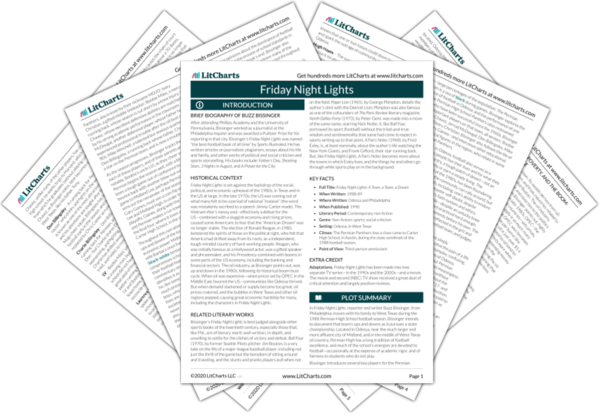Summary
Analysis
Bissinger describes the next pep rally, after the Marshall game, where the Pepettes, the Panthers, and the Permian fans seem to have recovered their spirits after the loss the previous week. Bissinger then follows Don Billingsley through a day of school, in which Don goes to food science class, watches a movie in sociology, showing the “investigative reporting” of the newscaster Geraldo Rivera, and generally does very little work—a typical football player’s schedule at Permian. Don states that his job, during football season, is to play, and school is merely something he has to do in order to be on the field.
Bissinger makes no bones about describing many of the course offerings at Permian as, effectively, jokes, classes that football players can pass easily, in order to maintain GPAs high enough to ensure their continued place on the team. Billingsley, even more than other football players, takes advantage of an easy schedule. Yet his excesses highlight what seems a fact for many of the players: that school is not as important to them, or the community they live in, as football.
Themes
Bissinger notes that SAT scores and overall grades have dipped at Permian since the 1970s. Some teachers and community members blame this drop on the new “ethnic composition” of the school, which, after federal desegregation in the early ‘80s, caused an influx of black and some Latino students to enter what was a mostly white school. Others, however, blame different factors: the bust in the local oil economy in the late’80s, or “the breakdown of the family unit.” Teachers tell Bissinger that students seem now only to care about “having a good time,” and about following Permian football.
Bissinger here notes the obvious racial biases of people in positions of authority within Permian High. Rather than admitting that the erosion of academic standards has been forced upon them, by a culture demanding the privilege of the football team above all else, teachers are content to blame the “lowered standards” on the influx of a “new population of students.” Bissinger describes players, like Billingsley, who take school as a joke and are white, as a way of counteracting this bias.
Themes
Bissinger interviews some female students, who claim that schoolwork is less important than finding a boyfriend—football players are at the top of the school food chain—and planning for marriage and domestic responsibilities. Bissinger finds a couple students, including Brian Chavez (who is on the football team) who are serious about their schoolwork, but in general, football players, and many other Permian students, male and female, take easy course loads. Teachers at Permian have begun to respond to student apathy by giving up themselves—showing more videos, assigning easier homework.
Brian Chavez is, for Bissinger, a beacon of hope in the district, a student whose commitment to football is matched or even surpassed by his commitment to his studies. Bissinger later traces Chavez’s goals, in part, to those of Chavez’s father, Tony, who was himself the son of immigrants from Mexico, and who worked his way through law school and moved to the largely white, middle-class east side of Odessa, where his family now lives.
Themes
Bissinger follows Brian Chavez around the school, and finds that he performs well in class—he is a diligent student, polite, hardworking, and he seems less anxious than some of the other football players. Bissinger attributes this to the fact that Chavez has plans and ambitions off the football field—he still wants to attend Harvard—meaning that Chavez’s performance on Friday night is not the only thing in his life. Bissinger interviews an English teacher named LaRue Moore, who argues that football has a place at Permian, but feels that the school’s football culture has been greatly amplified to the detriment of other academic disciplines. She says that, recently, the English department received its first and only computer, whereas the football team has had advanced computer and video technology for years.
For Bissinger, it is not simply that Chavez wishes to attend Harvard, or even that he is an immensely talented student—although both these are true. Rather, Bissinger seems to value most Chavez’s maturity, his willingness to understand that there is more to life than football, and that, in a matter of months, the dream of Friday nights will be over. Chavez sets himself apart from his teammates by refusing to believe that his life is over or will be diminished when he leaves the field. Rather, he understands that it is just beginning, once he makes his way to college.
Themes
Get the entire Friday Night Lights LitChart as a printable PDF.

Bissinger interviews the Ector County superintendent, Hugh Hayes, who, like LaRue Moore, argues that football has now achieved a kind of holy position in the region, meaning that very little money, time, or energy is allocated for academic pursuits in the schools. Hayes hopes to reverse this trend, but does not seem especially hopeful that much will change. Bissinger shadows Boobie one day in school, and notes that many of Boobie’s classes are taken far below the level of the average high school senior. Although Boobie receives some special attention from teachers—an effort to help him academically—for the most part, Boobie is coddled and allowed to sit during the school day—so that he can be ready to play Permian football on the weekends.
Boobie’s classes, even more so than Billingsley’s, are a mixture of immensely easy assignments, with very little oversight. Boobie has learning difficulties, and is the beneficiary of some well-intentioned programs designed to help him navigate the curriculum. But, all too frequently, for Bissinger, Boobie is merely allowed to sit while the school day takes place around him. Bissinger considers this a double injustice, for it deprives Boobie of a meaningful education—of which he is more than capable—and it treats him only as a player, not as a student.
Themes












